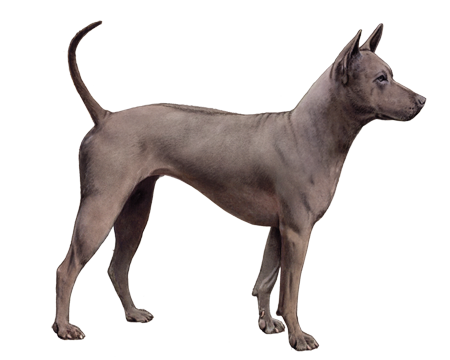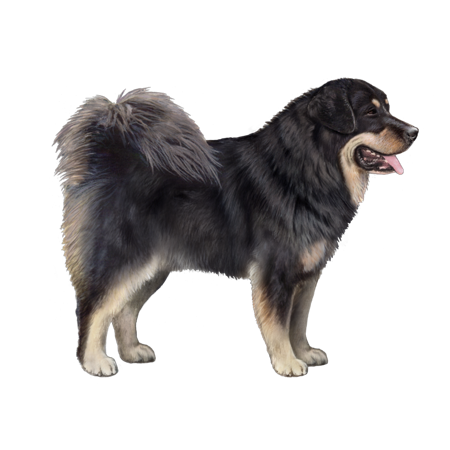
Thai Ridgeback
The Thai Ridgeback is a muscular, athletic dog best known for its strong guarding and predatory instincts. Experienced owners who prioritize training and socialization can help these independent dogs become loving, loyal family pets.
Interested in discovering if your dog is a Thai Ridgeback?
Check out Wisdom Panel's DNA tests.

Thai Ridgeback Traits
General Appearance
Thai Ridgebacks have a lean, muscular build. As hounds, they are natural athletes. Their bodies are longer than they are tall. And they have wedge-shaped heads, long, straight noses, strong jaws, upright ears, and thick tails the slightly curve toward the tips. The breed's forehead wrinkles, especially when the dog is attentive.
Coat and Coloring
The Thai Ridgeback's short, smooth coat comes in solid colors—such as red, black, blue-gray, or light fawn (called Isabella). Some dogs have red or fawn coloring with black masks. Brindle and white coats are also possible but not considered acceptable by breed standards. The Thai Ridgeback's name comes from a strip of hair down the center of the back. This strip grows in a direction opposite of the rest of the coat, creating a pronounced ridge.
Distinctive Physical Traits
Thai Ridgebacks can have eight distinctive ridge patterns: needle, feather, arrow, lute, violin, bowling pin, leaf, and saddleback. All are allowed in the breed standard as long as the ridge is symmetrical and clearly defined. Puppies are sometimes born without the ridge, and it develops over time.
This breed can also have a spotted tongue (of blue/black pigmentation), and dogs from Northern Thailand often have dew claws on their back feet.
Thai Ridgeback Temperament
Harsh conditions in Thailand forced this breed to hunt for food, resulting in strong survival instincts. Though most owners keep Thai Ridgebacks as companion animals, they retain an independent, self-sufficient nature.
Hunters at heart, Thai Ridgebacks often stalk or chase smaller animals and may be aggressive toward other dogs. They aren't overly affectionate, but they do bond with their owners and seek to protect them. For this reason, they tend to be reserved and suspicious around strangers and unfamiliar animals.
These strong-willed dogs do best in homes with patient, experienced pet parents who understand canine behavior. Thai Ridgebacks aren't a great fit for families with small children.


Thai Ridgeback History
As you might expect, the Thai Ridgeback comes from Thailand. Historical documents from the 1600s refer to the breed, which likely descended from the Funan Ridgeback Dog (whose own origins date back more than 1,000 years). These dogs hunted all kinds of animals, from small mammals to venomous cobras.
Due to the relative isolation and limited transportation in their native region of eastern Thailand, Thai Ridgebacks had few chances to mate. As a result, the breed's bloodline remained fairly pure. Today, it's uncommon to see the Thai Ridgeback outside of Thailand—where it's still considered a primitive breed.
Thai Ridgeback Care
Nutrition
These active dogs need a high-quality dog food that is appropriate for their life stage (e.g., puppy, adult, senior). Measuring out portions can prevent overfeeding, and limiting treats will help your dog retain their athletic build.
Grooming
Thai Ridgebacks have short coats that require minimal care. Occasional brushing and baths will remove loose hair and keep these pups looking good. With no undercoat and minimal shedding, this breed produces less dander, making it suitable for people with allergies.
Thai Ridgebacks have strong, fast-growing nails that need to be trimmed regularly to keep them from cracking, splitting, or becoming overgrown and painful. And an at-home dental care routine—along with professional cleanings—is essential to the overall health of your dog.
Exercise
These active, athletic dogs require a lot of exercise. Plan on several brisk on-leash walks (or runs) every day. Games like fetch and hide-and-seek can also help satisfy your Thai Ridgeback's need to move.
This breed may also enjoy swimming, hiking, and dog sports—such as agility, rally, lure coursing, and obedience. But due to their strong prey drive, Thai Ridgebacks should only be allowed off-leash in securely fenced areas. And keep in mind, they aren't great candidates for dog parks or other group play settings.
Training
The Thai Ridgeback's independent, self-sufficient nature can make the breed hard to train. Even experienced owners well-versed in dog behavior must work hard to get Thai Ridgebacks to obey.
A combination of positive reinforcement, reward-based training, and firm correction is usually the best approach. Early socialization is also essential, as it will help this breed be more comfortable around strangers.

Breed Group
Asian and Oceanian
The Asian and Oceanian group is comprised of breeds whose origins lie in Asia, which have spread as far as Australia, the islands of the Pacific, and the Arctic. This group is possibly the most ancient of all breed groups and were bred for a variety of purposes, including guarding, hunting, and as draft dogs.
Resources
http://www.thaidog.org/faq.html
http://www.fci.be/Nomenclature/Standards/338g05-en.pdf
https://www.akc.org/dog-breeds/thai-ridgeback/
Reviewed July 26, 2020 by Annette Louviere, DVM












































